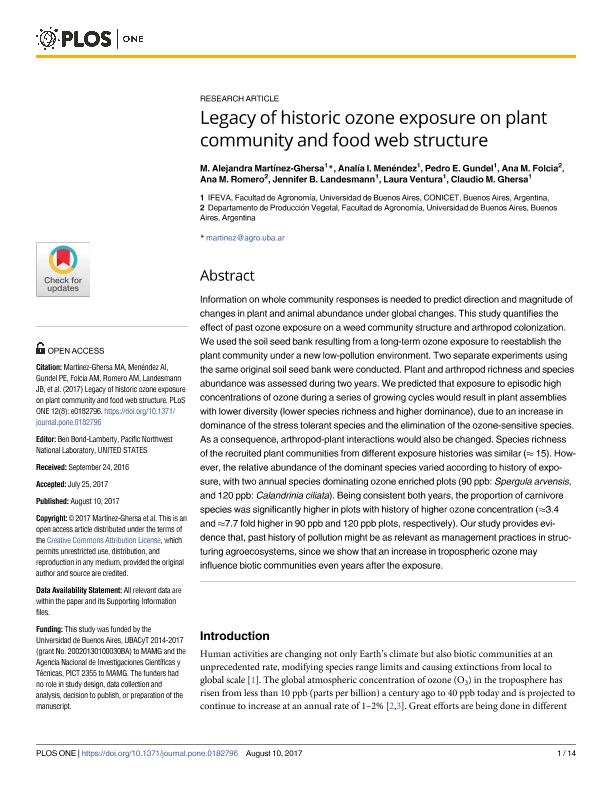Artículo
Legacy of historic ozone exposure on plant community and food web structure
Martinez-Ghersa, Maria Alejandra ; Menéndez, Analía I.; Gundel, Pedro Emilio
; Menéndez, Analía I.; Gundel, Pedro Emilio ; Folcia, Ana M.; Romero, Ana María; Landesmann, Jennifer Brenda
; Folcia, Ana M.; Romero, Ana María; Landesmann, Jennifer Brenda ; Ventura Molina, Laura Isabel
; Ventura Molina, Laura Isabel ; Ghersa, Claudio Marco
; Ghersa, Claudio Marco
 ; Menéndez, Analía I.; Gundel, Pedro Emilio
; Menéndez, Analía I.; Gundel, Pedro Emilio ; Folcia, Ana M.; Romero, Ana María; Landesmann, Jennifer Brenda
; Folcia, Ana M.; Romero, Ana María; Landesmann, Jennifer Brenda ; Ventura Molina, Laura Isabel
; Ventura Molina, Laura Isabel ; Ghersa, Claudio Marco
; Ghersa, Claudio Marco
Fecha de publicación:
08/2017
Editorial:
Public Library of Science
Revista:
Plos One
ISSN:
1932-6203
e-ISSN:
1932-6203
Idioma:
Inglés
Tipo de recurso:
Artículo publicado
Clasificación temática:
Resumen
Information on whole community responses is needed to predict direction and magnitude of changes in plant and animal abundance under global changes. This study quantifies the effect of past ozone exposure on a weed community structure and arthropod colonization. We used the soil seed bank resulting from a long-term ozone exposure to reestablish the plant community under a new low-pollution environment. Two separate experiments using the same original soil seed bank were conducted. Plant and arthropod richness and species abundance was assessed during two years. We predicted that exposure to episodic high concentrations of ozone during a series of growing cycles would result in plant assemblies with lower diversity (lower species richness and higher dominance), due to an increase in dominance of the stress tolerant species and the elimination of the ozone-sensitive species. As a consequence, arthropod-plant interactions would also be changed. Species richness of the recruited plant communities from different exposure histories was similar (≈ 15). However, the relative abundance of the dominant species varied according to history of exposure, with two annual species dominating ozone enriched plots (90 ppb: Spergula arvensis, and 120 ppb: Calandrinia ciliata). Being consistent both years, the proportion of carnivore species was significantly higher in plots with history of higher ozone concentration (≈3.4 and ≈7.7 fold higher in 90 ppb and 120 ppb plots, respectively). Our study provides evidence that, past history of pollution might be as relevant as management practices in structuring agroecosystems, since we show that an increase in tropospheric ozone may influence biotic communities even years after the exposure.
Palabras clave:
Food Web
,
Global Change
,
Ecosystems
,
Arthropods
Archivos asociados
Licencia
Identificadores
Colecciones
Articulos(IFEVA)
Articulos de INST.D/INV.FISIOLOGICAS Y ECO.VINCULADAS A L/AGRIC
Articulos de INST.D/INV.FISIOLOGICAS Y ECO.VINCULADAS A L/AGRIC
Citación
Martinez-Ghersa, Maria Alejandra; Menéndez, Analía I.; Gundel, Pedro Emilio; Folcia, Ana M.; Romero, Ana María; et al.; Legacy of historic ozone exposure on plant community and food web structure; Public Library of Science; Plos One; 12; 8; 8-2017
Compartir
Altmétricas



